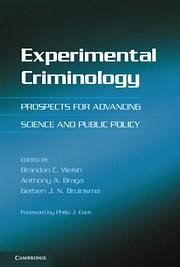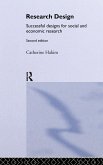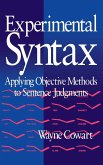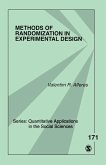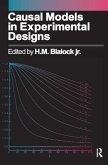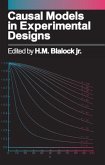Experimental Criminology
Herausgeber: Welsh, Brandon C.; Bruinsma, Gerben J. N.; Braga, Anthony A.
Experimental Criminology
Herausgeber: Welsh, Brandon C.; Bruinsma, Gerben J. N.; Braga, Anthony A.
- Gebundenes Buch
- Merkliste
- Auf die Merkliste
- Bewerten Bewerten
- Teilen
- Produkt teilen
- Produkterinnerung
- Produkterinnerung
The essays in this volume report on new and innovative contributions that experimental criminology is making to basic scientific knowledge and public policy.
Andere Kunden interessierten sich auch für
![Experimental Sociology Experimental Sociology]() Davide BarreraExperimental Sociology92,99 €
Davide BarreraExperimental Sociology92,99 €![Using Propensity Scores in Quasi-Experimental Designs Using Propensity Scores in Quasi-Experimental Designs]() William M. HolmesUsing Propensity Scores in Quasi-Experimental Designs105,99 €
William M. HolmesUsing Propensity Scores in Quasi-Experimental Designs105,99 €![Research Design Research Design]() Catherine HakimResearch Design294,99 €
Catherine HakimResearch Design294,99 €![Experimental Syntax Experimental Syntax]() Wayne CowartExperimental Syntax196,99 €
Wayne CowartExperimental Syntax196,99 €![Methods of Randomization in Experimental Design Methods of Randomization in Experimental Design]() Valentim R. AlferesMethods of Randomization in Experimental Design48,99 €
Valentim R. AlferesMethods of Randomization in Experimental Design48,99 €![Causal Models in Experimental Designs Causal Models in Experimental Designs]() H. M. BlalockCausal Models in Experimental Designs272,99 €
H. M. BlalockCausal Models in Experimental Designs272,99 €![Causal Models in Experimental Designs Causal Models in Experimental Designs]() H. M. BlalockCausal Models in Experimental Designs71,99 €
H. M. BlalockCausal Models in Experimental Designs71,99 €-
-
-
The essays in this volume report on new and innovative contributions that experimental criminology is making to basic scientific knowledge and public policy.
Hinweis: Dieser Artikel kann nur an eine deutsche Lieferadresse ausgeliefert werden.
Hinweis: Dieser Artikel kann nur an eine deutsche Lieferadresse ausgeliefert werden.
Produktdetails
- Produktdetails
- Verlag: Cambridge University Press
- Seitenzahl: 324
- Erscheinungstermin: 7. November 2013
- Englisch
- Abmessung: 235mm x 157mm x 22mm
- Gewicht: 622g
- ISBN-13: 9781107032231
- ISBN-10: 1107032237
- Artikelnr.: 39343963
- Herstellerkennzeichnung
- Libri GmbH
- Europaallee 1
- 36244 Bad Hersfeld
- gpsr@libri.de
- Verlag: Cambridge University Press
- Seitenzahl: 324
- Erscheinungstermin: 7. November 2013
- Englisch
- Abmessung: 235mm x 157mm x 22mm
- Gewicht: 622g
- ISBN-13: 9781107032231
- ISBN-10: 1107032237
- Artikelnr.: 39343963
- Herstellerkennzeichnung
- Libri GmbH
- Europaallee 1
- 36244 Bad Hersfeld
- gpsr@libri.de
Foreword Philip J. Cook; Preface; 1. Experimenting with crime and criminal
justice Brandon C. Welsh, Anthony A. Braga and Gerben J. N. Bruinsma; Part
I. Experimenting with Crime: 2. Experimental tests of criminological theory
Jean Marie McGloin and Kyle J. Thomas; 3. Experimental neurocriminology:
etiology and treatment Adrian Raine, Michael Rocque and Brandon C. Welsh;
4. Computer simulation experiments and the development of criminological
theory Christopher J. Sullivan; 5. Experiments in guardianship research
Maud van Bavel and Henk Elfers; Part II. Experimenting with Crime
Prevention and Criminal Justice: 6. Randomized experiments in criminology:
what has been learned from long-term follow-ups? David P. Farrington and
Brandon C. Welsh; 7. Increasing equivalence in small sample place-based
experiments: taking advantage of block randomization methods Charlotte E.
Gill and David Weisburd; 8. Multisite randomized trials in criminology
Doris Layton MacKenzie, Janani Umamaheswar and Li-Chen Lin; 9. Using
regression discontinuity designs in crime research Emily G. Owens and Jens
Ludwig; 10. Quasi-experimentation when random assignment is not possible:
observations from practical experiences in the field Anthony A. Braga; 11.
Systematic reviews and cost-benefit analyses: toward evidence-based crime
policy Brandon C. Welsh, Peter H. van der Laan and Meghan E. Hollis; Part
III. Assessing Research Evidence and Future Directions: 11. Systematic
reviews and cost-benefit analyses: toward evidence-based crime policy
Brandon C. Welsh, Peter H. van der Laan and Meghan E. Hollis; 12.
Integrating experimental and observational methods to improve criminology
and criminal justice policy Anthony A. Braga, Brandon C. Welsh and Gerben
J. N. Bruinsma.
justice Brandon C. Welsh, Anthony A. Braga and Gerben J. N. Bruinsma; Part
I. Experimenting with Crime: 2. Experimental tests of criminological theory
Jean Marie McGloin and Kyle J. Thomas; 3. Experimental neurocriminology:
etiology and treatment Adrian Raine, Michael Rocque and Brandon C. Welsh;
4. Computer simulation experiments and the development of criminological
theory Christopher J. Sullivan; 5. Experiments in guardianship research
Maud van Bavel and Henk Elfers; Part II. Experimenting with Crime
Prevention and Criminal Justice: 6. Randomized experiments in criminology:
what has been learned from long-term follow-ups? David P. Farrington and
Brandon C. Welsh; 7. Increasing equivalence in small sample place-based
experiments: taking advantage of block randomization methods Charlotte E.
Gill and David Weisburd; 8. Multisite randomized trials in criminology
Doris Layton MacKenzie, Janani Umamaheswar and Li-Chen Lin; 9. Using
regression discontinuity designs in crime research Emily G. Owens and Jens
Ludwig; 10. Quasi-experimentation when random assignment is not possible:
observations from practical experiences in the field Anthony A. Braga; 11.
Systematic reviews and cost-benefit analyses: toward evidence-based crime
policy Brandon C. Welsh, Peter H. van der Laan and Meghan E. Hollis; Part
III. Assessing Research Evidence and Future Directions: 11. Systematic
reviews and cost-benefit analyses: toward evidence-based crime policy
Brandon C. Welsh, Peter H. van der Laan and Meghan E. Hollis; 12.
Integrating experimental and observational methods to improve criminology
and criminal justice policy Anthony A. Braga, Brandon C. Welsh and Gerben
J. N. Bruinsma.
Foreword Philip J. Cook; Preface; 1. Experimenting with crime and criminal
justice Brandon C. Welsh, Anthony A. Braga and Gerben J. N. Bruinsma; Part
I. Experimenting with Crime: 2. Experimental tests of criminological theory
Jean Marie McGloin and Kyle J. Thomas; 3. Experimental neurocriminology:
etiology and treatment Adrian Raine, Michael Rocque and Brandon C. Welsh;
4. Computer simulation experiments and the development of criminological
theory Christopher J. Sullivan; 5. Experiments in guardianship research
Maud van Bavel and Henk Elfers; Part II. Experimenting with Crime
Prevention and Criminal Justice: 6. Randomized experiments in criminology:
what has been learned from long-term follow-ups? David P. Farrington and
Brandon C. Welsh; 7. Increasing equivalence in small sample place-based
experiments: taking advantage of block randomization methods Charlotte E.
Gill and David Weisburd; 8. Multisite randomized trials in criminology
Doris Layton MacKenzie, Janani Umamaheswar and Li-Chen Lin; 9. Using
regression discontinuity designs in crime research Emily G. Owens and Jens
Ludwig; 10. Quasi-experimentation when random assignment is not possible:
observations from practical experiences in the field Anthony A. Braga; 11.
Systematic reviews and cost-benefit analyses: toward evidence-based crime
policy Brandon C. Welsh, Peter H. van der Laan and Meghan E. Hollis; Part
III. Assessing Research Evidence and Future Directions: 11. Systematic
reviews and cost-benefit analyses: toward evidence-based crime policy
Brandon C. Welsh, Peter H. van der Laan and Meghan E. Hollis; 12.
Integrating experimental and observational methods to improve criminology
and criminal justice policy Anthony A. Braga, Brandon C. Welsh and Gerben
J. N. Bruinsma.
justice Brandon C. Welsh, Anthony A. Braga and Gerben J. N. Bruinsma; Part
I. Experimenting with Crime: 2. Experimental tests of criminological theory
Jean Marie McGloin and Kyle J. Thomas; 3. Experimental neurocriminology:
etiology and treatment Adrian Raine, Michael Rocque and Brandon C. Welsh;
4. Computer simulation experiments and the development of criminological
theory Christopher J. Sullivan; 5. Experiments in guardianship research
Maud van Bavel and Henk Elfers; Part II. Experimenting with Crime
Prevention and Criminal Justice: 6. Randomized experiments in criminology:
what has been learned from long-term follow-ups? David P. Farrington and
Brandon C. Welsh; 7. Increasing equivalence in small sample place-based
experiments: taking advantage of block randomization methods Charlotte E.
Gill and David Weisburd; 8. Multisite randomized trials in criminology
Doris Layton MacKenzie, Janani Umamaheswar and Li-Chen Lin; 9. Using
regression discontinuity designs in crime research Emily G. Owens and Jens
Ludwig; 10. Quasi-experimentation when random assignment is not possible:
observations from practical experiences in the field Anthony A. Braga; 11.
Systematic reviews and cost-benefit analyses: toward evidence-based crime
policy Brandon C. Welsh, Peter H. van der Laan and Meghan E. Hollis; Part
III. Assessing Research Evidence and Future Directions: 11. Systematic
reviews and cost-benefit analyses: toward evidence-based crime policy
Brandon C. Welsh, Peter H. van der Laan and Meghan E. Hollis; 12.
Integrating experimental and observational methods to improve criminology
and criminal justice policy Anthony A. Braga, Brandon C. Welsh and Gerben
J. N. Bruinsma.

